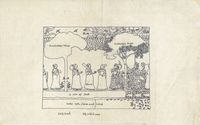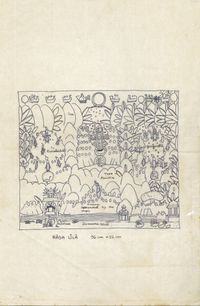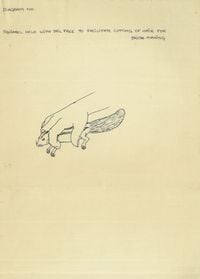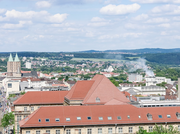Borrowing from and translating the vocabulary of Indian painting traditions, Nilima Sheikh's artworks have ranged from small paintings reminiscent of Mughal and Rajput miniatures, to vertical scrolls rooted in East Asian customs. Over her 50-year career, the Baroda-based artist has woven into her work her concerns with femininity, tradition, violence, poetry and national politics.
Read MoreAfter studying painting at the Maharaja Sayajirao University of Baroda in the 1960s and 1970s, Sheikh's interests aligned with those of other emerging artists who strove to situate figuration and narrative in a contemporary context. Indicative of this concern, Sheikh's Songspace—exhibited in 1995 at Gallery Chemould, Mumbai, and at Africus, the first Johannesburg Biennale—was a set of vertical, casein on canvas scrolls. The series' delicate, translucent colours intoned painterly and lyrical rhyme in their suggestions of an imagined landscape. Comprising of six double-sided tempera-painted canvasses hung beneath a painted canopy, Shamiana was erected in 1996 for the 2nd Asia-Pacific Triennial at Queensland Art Gallery, Brisbane, and alluded to the temporary tents erected during some Indian weddings.
In 2001, the exhibition Conversations with Traditions: Nilima Sheikh and Shahzia Sikander at Asia Society, New York, exhibited the artists' distinct engagements with pre-modern Indian painting. Included was Sheikh's landmark series 'When Champa Grew Up' (1984), which described the tragic life story of a woman murdered for her dowry by her husband's family. In her 2018 conversation with Ocula Magazine, the artist reflected on her process of finding 'the right language' for the topic. Arising from her lasting interest in narration and writing, Sheikh offered the lyrics from Gujarati oral folk songs as accompanying texts for the series.
In The Country Without a Post Office: Reading Agha Shahid Ali—a solo exhibition at Gallery Chemould in 2003 that took its name from an anthology of Ali's writing—Sheikh presented a visualisation of poetics and politics. The artist's citing of Ali's poetry, which focused on the contemporary conflict in Kashmir, reflected on the inherent conflicts between aesthetics and trauma. As in some of Sheikh's earlier work, these paintings employed the syntax of free verse, with compositional narratives developing not from linear descriptions but from the flexibility of independent and layered readings.
Sheikh lives and works in Baroda, India.
Lines of Flight, Asia Art Archive, Hong Kong (2018); Each night put Kashmir in your dreams, The Art Institute of Chicago (2014), Chemould Prescott Road, Mumbai, and Lalit Kala Akademi, New Delhi (2010).
4th Kochi-Muziris Biennale (2018); documenta 14, Athens and Kassel (2017); Landscape of Thinking slow: Contemporary Art from China & India, National Museum of Modern and Contemporary Art, Seoul (2013).
Ocula | 2021







